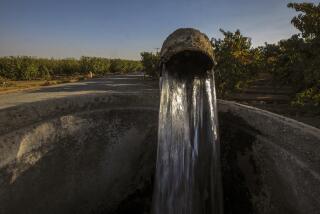Editorial: What we don’t know about fracking could hurt us
- Share via
A year and a half in the making, a new scientific report on hydraulic fracturing in the state offers Californians the less than satisfying revelation that scientists are still in the dark about fracking. That’s not to denigrate the report released last week by the California Council on Science and Technology, which was carefully researched, objectively written and based on the best available information. The problem is that the best available information is terribly deficient, which should give pause to state residents and regulators.
Fracking, a form of oil well stimulation, uses chemical-laced water injected into the ground at high pressure to open fissures and extract previously unreachable oil or gas. According to the report, there is inadequate information about more than half the chemicals used in fracking, including their toxicity levels and potential danger to the environment and public health. That information is important because wastewater from fracking operations has to be dumped somewhere, and in some cases ends up in unlined ponds, from which it can trickle into groundwater that might be used for drinking, the report said.
The wastewater also might be used to irrigate crops, the report noted, and although such water is supposed to be treated first, no agency is making sure that happens.
How big is the risk? Probably low, the report surmised, but we don’t know that either. It certainly doesn’t inspire confidence that lax oversight by the state’s Division of Oil, Gas and Geothermal Resources allowed wastewater from oil drilling operations to be stored in hundreds of wells that were supposed to have been protected. Californians wouldn’t even have this new report if not for legislation passed in 2013, which required the state’s minerals overseer to commission it and develop regulations requiring extensive monitoring of and reporting on fracking operations.
But because of timing glitches, the regulations came out a week before the report did — not an ideal process. And although the agency overseeing oil and gas is under new management and has pledged to take the report’s findings into consideration when issuing new rules, Californians need more — including an independent overseer — to guarantee that this mission is carried out effectively.
Sen. Fran Pavley (D-Agoura Hills), author of the 2013 fracking bill, is adding provisions to an existing bill to address some of the issues in the report. SB 248 would phase out the use of unlined ponds for waste and call for a uniform list of allowable chemicals in fracking. That’s good as far as it goes, which isn’t nearly far enough.
Pushing forward in the dark isn’t smart. It has long been apparent that a moratorium on major new fracking is in order until more is known about its risks and benefits. That’s all the more reasonable now that we understand how little we understand.
Follow the Opinion section on Twitter @latimesopinion and Facebook
More to Read
A cure for the common opinion
Get thought-provoking perspectives with our weekly newsletter.
You may occasionally receive promotional content from the Los Angeles Times.









